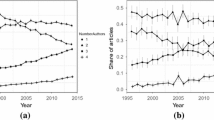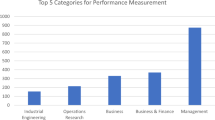Abstract
This article is motivated by two related research questions about research activity in the Operations Research/Management Science/Operations Management (OR/MS/OM) and Finance disciplines. First, we investigate the influence of co-authorship on article impact in OR/MS/OM. Second, we develop a number of citation metrics to explore the nature of scholarly exchange between top OR/MS/OM and Finance journals. We work with a large sample of articles published across 2001–2008 for twenty OR/MS/OM journals and nineteen Finance journals, with corresponding citations up to and including year 2012. Key findings from the first research question indicate a higher impact for articles with multiple authors, but with the marginal gain brought by an additional author being insignificant for articles with three or more authors. For the second research question, we find that the Finance discipline borrows less from OR/MS/OM than vice versa, which highlights the potential for wider collaboration among researchers—particularly for Finance academics in exploring how various OR/MS/OM techniques can be adopted or adapted into their research. Finally, we discover that the ranking of OR/MS/OM journals is determined more by the extent that they are cited in other disciplines, but observe a gradual rise in self-perpetuating behavior in the OR/MS/OM discipline.
Similar content being viewed by others
Notes
As indicated on their website: http://pubsonline.informs.org/page/mnsc/editorial-statements.
Avkiran (2013) finds no statistically significant difference between results based on a 4-year citation count against a 5-year citation count.
References
Avkiran, N. K. (1997). Scientific collaboration in finance does not lead to better quality research. Scientometrics, 39(2), 173–184.
Avkiran, N. K. (2013). An empirical investigation of the influence of collaboration in Finance on article impact. Scientometrics, 95(3), 911–925.
Beaver, D. B. (1986). Collaboration and teamwork in Physics. Czechoslovak Journal of Physics B, 36(1), 14–18.
Bertrand, J. W. M., & Fransoo, J. C. (2002). Operations management research methodologies using quantitative modeling. International Journal of Operations & Production Management, 22(2), 241–264.
Black, F. (1989). How we came up with the option formula. Journal of Portfolio Management, 15(2), 4–8.
Borokhovich, K. A., Bricker, R. J., & Simkins, B. J. (2000). An analysis of Finance journal impact factors. The Journal of Finance, 55(3), 1457–1469.
Chase, R. B., Jacobs, F. R., & Aquilano, N. J. (2006). Operations management for competitive advantage (11th ed.). New York: McGraw-Hill Irwin.
Cole, J. R., & Cole, S. (1973). Social stratification in science. Chicago: The University of Chicago Press.
Conover, W. J. (1999). Practical nonparametric statistics (3rd ed.). New York: Wiley.
Currie, R. R., & Pandher, G. S. (2011). Finance journal rankings and tiers: An active scholar assessment methodology. Journal of Banking & Finance, 35(1), 7–20.
Denizel, M., Usdiken, B., & Tuncalp, D. (2003). Drift or shift? Continuity, change, and international variation in knowledge production in OR/MS. Operations Research, 51(5), 711–720.
Furnham, A. F. (1990). Quantifying quality: An argument in favor of citation counts. Journal of Further and Higher Education, 14(2), 105–110.
Gorman, M. F., & Kanet, J. J. (2005). Evaluating operations management-related journals via the author affiliation index. Manufacturing & Service Operations Management, 7(1), 3–19.
Greene, W. H. (2012). Econometric analysis. Boston: Prentice Hall.
Holsapple, C. W., & Lee-Post, A. (2010). Behavior-based analysis of knowledge dissemination channels in operations management. OMEGA-International Journal of Management Science, 38(3–4), 167–178.
Judge, T. A., Cable, D. M., Colbert, A. E., & Rynes, S. L. (2007). What causes a management article to be cited—Article, author, or journal? Academy of Management Journal, 50(3), 491–506.
Katz, J. S., & Hicks, D. (1997). How much is a collaboration worth? A calibrated bibliometric model. Scientometrics, 40(3), 541–554.
Kuhnen, C. M., & Chiao, J. Y. (2009). Genetic determinants of financial risk taking. PLoS One, 4(2), e4362. doi:10.1371/journal.pone.0004362.
Lawani, S. M. (1977). Citation analysis and quality of scientific productivity. Bioscience, 27(1), 26–31.
Lawani, S. M. (1986). Some bibliometric correlates of quality in scientific-research. Scientometrics, 9(1–2), 13–25.
Lawani, S. M., & Bayer, A. E. (1983). Validity of citation criteria for assessing the influence of scientific publications—New evidence with peer assessment. Journal of the American Society for Information Science, 34(1), 59–66.
Linderman, K., & Chandrasekaran, A. (2010). The scholarly exchange of knowledge in operations management. Journal of Operations Management, 28(4), 357–366.
Lockett, A., & McWilliams, A. (2005). The balance of trade between disciplines—Do we effectively manage knowledge? Journal of Management Inquiry, 14(2), 139–150.
Lowry, P. B., Moody, G. D., Gaskin, J., Galletta, D. F., Humphreys, S. L., Barlow, J. B., et al. (2013). Evaluating journal quality and the association for information systems senior scholars’ journal basket via bibliometric measures: Do expert journal assessments add value? MIS Quarterly, 37(4), 993–1012.
LSE Public Policy Group. (2011). Maximizing the impact of your research: A handbook for social sciences, Consultation Draft 3. http://www.lse.ac.uk/government/research/resgroups/LSEPublicPolicy/Docs/LSE_Impact_Handbook_April_2011.pdf
Markowitz, H. (1952). Portfolio selection. The Journal of Finance, 7(1), 77–91.
McDonald, J. H. (2008). Handbook of biological statistics. Baltimore: Sparky House Publishing.
McFadyen, M. A., & Cannella, A. A. (2004). Social capital and knowledge creation: Diminishing returns of the number and strength of exchange relationships. Academy of Management Journal, 47(5), 735–746.
Meredith, J. R., Steward, M. D., & Lewis, B. R. (2011). Knowledge dissemination in operations management: Published perceptions versus academic reality. OMEGA-International Journal of Management Science, 39(4), 435–446.
Olson, J. E. (2005). Top-25-business-school professors rate journals in operations management and related fields. Interfaces, 35(4), 323–338.
Petersen, C. G., Aase, G. R., & Heiser, D. R. (2011). Journal ranking analyses of operations management research. International Journal of Operations & Production Management, 31(4), 405–422.
Pieters, R., & Baumgartner, H. (2002). Who talks to whom? Intra- and interdisciplinary communication of economics journals. Journal of Economic Literature, 40(2), 483–509.
Pratt, J. A., Hauser, K., & Sugimoto, C. R. (2012). Defining the intellectual structure of information systems and related college of business disciplines: A bibliometric analysis. Scientometrics, 93, 279–304.
Rainer, R. K., & Miller, M. D. (2005). Examining differences across journal rankings. Communications of the ACM, 48(2), 91–94.
Sidiropoulos, A., & Manolopoulos, Y. (2006). Generalized comparison of graph-based ranking algorithms for publications and authors. The Journal of Systems and Software, 79, 1679–1700.
Sonnenwald, D. H. (2007). Scientific collaboration. Annual Review of Information Science and Technology, 41(1), 643–681.
Stonebraker, J. S., Gil, E., Kirkwood, C. W., & Handfield, R. B. (2012). Impact factor as a metric to assess journals where OM research is published. Journal of Operations Management, 30(1–2), 24–43.
Tahai, A., & Meyer, M. J. (1999). A revealed preference study of management journals’ direct influences. Strategic Management Journal, 20(3), 279–296.
Wuchty, S., Jones, B. F., & Uzzi, B. (2007). The increasing dominance of teams in production of knowledge. Science, 316(5827), 1036–1039.
Xu, Z., Cheang, B., Lim, A., & Wen, Q. (2011). Evaluating OR/MS Journals via PageRank. Interfaces, 41(4), 375–388.
Acknowledgments
We appreciate the constructive criticism provided by two referees, as well as the time spent by the Associate Editor Professor Ali Emrouznejad. We extend our thanks to Professors Tom Smith and Barry Oliver for reading a pre-submission copy of this article. We also wish to express our appreciation for the assistance provided by research assistant Keay-shen See, as well as the specialized guidance provided by reference librarians, Martin Cvelbar and Amberyn Thomas. We take responsibility for all remaining shortcomings of this paper.
Author information
Authors and Affiliations
Corresponding author
Rights and permissions
About this article
Cite this article
Avkiran, N.K., Alpert, K. The influence of co-authorship on article impact in OR/MS/OM and the exchange of knowledge with Finance in the twenty-first century. Ann Oper Res 235, 51–73 (2015). https://doi.org/10.1007/s10479-015-1880-y
Published:
Issue Date:
DOI: https://doi.org/10.1007/s10479-015-1880-y




